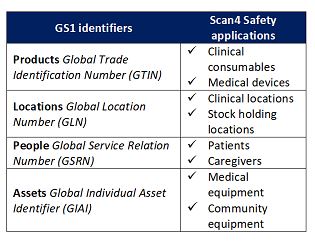What is Scan4Safety?
In 2016, the Department of Health & Social Care introduced the Scan4Safety initiative to six NHS England trusts. Designed to improve operational efficiency, enhance patient safety, and reduce costs within NHS hospitals, the Scan4Safety initiative supports clinicians in delivering optimal care by leveraging barcodes and GS1 unique identifiers, to facilitate the precise tracking and tracing of products, patients and locations across healthcare facilities.
Focused on end-to-end scanning of barcodes, the initiative contributes to effective inventory management through point-of-care scanning and process streamlining. GS1 unique identifiers play a crucial role in facilitating accurate identification, capture, and sharing of information among healthcare professionals as part of the Scan4Safety initiative.
The table below details the GS1 identifiers and some of the corresponding Scan4Safety applications.

Image source: How ‘Scan4Safety’ can effectively promote patient safety across the NHS – Thoughts from the Centre | Deloitte UK
If you would like to learn more about GS1 standards and how the organisation has helped to shape the healthcare system, check out this blog post: 50 Years of GS1: How the Barcode Improved Healthcare & Patient Safety (kmsoft.co.uk)
The Role of Inventory Management
Inventory management systems (IMSs) play a crucial role in healthcare settings, with half of all NHS trusts having implemented them. Given the importance of traceability and data accuracy in ensuring the effective delivery of patient care, the NHS is committed to accelerating the adoption of inventory management systems and point-of-care scanning across all trusts as part of the NHS England Commercial Strategic Framework.
The Scan4Safety initiative requires NHS trusts to adopt reliable inventory management systems to accurately capture data and attribute it to patients using electronic patient records. Inventory management systems empower healthcare providers with comprehensive product data, increased stock visibility, streamlined item retrieval, minimised clinical waste, and enhanced patient safety. Consequently, they provide significant efficiency gains and cost savings to healthcare providers.
The Scan4Safety initiative has already generated notable benefits, as highlighted in the 2020 evaluation report ‘A Scan of the Benefits’. For example. Royal Cornwall Hospital NHS Trust has witnessed a staggering 76% reduction in preventable error rates. Additionally, the initial six trusts reported recurring inventory savings of nearly £5 million.
The evaluation results demonstrate the transformative impact of Scan4Safety, highlighting its potential for generating time and cost savings for the NHS when implemented on a national scale across more trusts.
Advantages of Scan4Safety for Healthcare Providers
The clinical benefits brought by Scan4Safety are revolutionary for the UK healthcare sector. The implementation of inventory management systems to support this initiative has the potential to reshape care delivery methods and greatly improve patient outcomes. Inventory management, as an essential Scan4Safety component, offers countless benefits to healthcare facilities including:
Infection control
Inventory management systems facilitate the scanning of clinical and non-clinical supplies, as well as patients. This functionality not only supports the research and investigation of infection outbreaks, but also enables the analysis of findings to identify underlying causes.
Cost identification
Scanning identifiers empowers clinicians to access detailed patient and procedure-level costing information, facilitating the implementation of cost improvement initiatives.
Never event prevention
By scanning and validating patients, procedure locations, and medical supplies, safety measures are enhanced, ensuring consistency and reducing the likelihood of never events.
Product recall improvement
Inventory management systems automatically capture product data at the point-of-care, enabling the efficient recall of defective supplies.
As patient safety and financial and operational efficiency become increasingly more important in the UK healthcare sector, the introduction of the Scan4Safety initiative has provided valuable insights into its potential to revolutionise essential elements of the healthcare system. The initial pilot phase has demonstrated that by leveraging GS1 standards and integrating vital healthcare components such as procurement, medical devices, and clinical technology, patient safety can be elevated significantly.
The wider implementation of Scan4Safety can be supported by the evidence gathered from the evaluation report. While the widespread adoption of the initiative presents a complex challenge, the evidence gathered from the pilot phase involving the six trusts will act as a valuable guide. Embracing this innovation on a larger scale will drive cost reductions, enhance operational efficiency, and further elevate patient safety standards across NHS trusts nationwide, shaping the future landscape of healthcare delivery.




